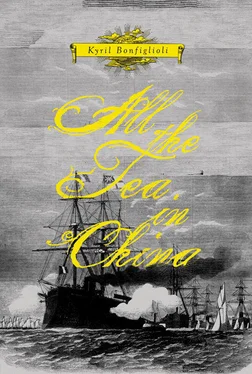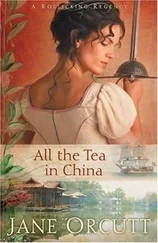No European may keep a household larger than the lowest grade of mandarin might employ.
No European may leave the factories in pleasure-boat or palanquin; no visits to the City or other suburbs are permitted. Each ten days a party of not more than ten may be conducted to the pleasure garden on Hanan Island; there they shall not mingle with the populace, become drunk or remain after dark.
All commerce and all communication with authority shall be carried out through the merchants of the Hong.
Smuggling and the giving or taking of credit are forbidden.
All ships must anchor, unload and load at Whampoa, thirteen miles below the City.
From the moment that we dropped our Pilot at the mouth of the Hooghly our voyage seemed to bear a charmed life. Every wind was in our favour and of the right force, every line cast overboard brought in a large and succulent fish, and our rate of passage was such that the Captain seemed often almost benevolent in his demeanour, despite Blanche’s protracted headaches. Taking the perilous Malacca Strait without the least trouble — indeed, without shortening sail by a stitch — we found another favourable wind which sped us north and a little east at a splendid rate of knots. Captain Knatchbull appeared on deck precisely twenty minutes before the masthead sighted land — the Island of Hainan — then, without troubling to open his telescope, he gave a grunt of self-approval and vanished below. For all his faults, he was an inspired navigator. This made the crew admire him, although he had forfeited all claim to their affections. In the event, we raised Lin-Tin in the unheard-of time of eighteen days out of Calcutta. Grog was served out to all the fo’c’sle people and they romped and skylarked almost as cheerily as they had in the days before the dreadful Martha Washington affair. Almost but not quite. The more thoughtless and carefree lads seemed to be quite themselves again but Tom Transom and the other older salts were subdued and concerned, while Sean O’Casey, the Irish, professed to have some inner presage of disaster. This gift is not uncommon amongst folk of Celtic blood. The Doctor, too, muttered as he worked, although his concoctions, now that he had fresh Indian spices and herbs to conjure with, seemed to make memory a liar. He dedicated himself to teasing my appetite — which has always been small — into an interested state with ever new delicacies.
Before going up the Pearl River to Whampoa, where the Eight Rules said that we must unload and load, and, later, by boat to the European Factories and the Hongs, we put in at Macao, a lovely island, in order to learn the going prices of the various grades of the drug, the latest edicts of the Lord of the World sitting in his Court of Heaven, and to smarten the ship before proceeding to Lin Tin and Whampoa. Macao was enchanting: the Portuguese had been there for more than two centuries and their absurd baroque architecture seemed to grow naturally out of that Oriental soil. Our first view of it was a charming little bay with a crescent of old white houses fringing its waterfont and above them a maze of houses, churches and monasteries of every size and shape and style you can imagine. Highest above all were some ancient and imposing forts: there were cannon there still, but now only used, I was told, for ceremonial saluting.
This delightful place was the centre of European society in the Treaty Coast, for no families could go up to the Factories, nor could the merchants themselves inhabit the Factories except in the shipping season — that is to say, when the south-west Monsoon, which had sped us here, was blowing out.
It fell to Peter, the most junior watch-keeping officer, to go ashore and carry out the bribery necessary to obtain a pass for the ship from the resident Chinese official, also to buy a landing-permit which cost thirteen shillings and fourpence — although it cost quite that sum again to be passed into the presence of the scoundrel who issued it. We were carried ashore in an “egg-boat”, a curious craft some eight feet long and six feet in the beam and half-roofed over with a hemisphere of matting. It was propelled by two bold and beddable girls wearing, if you can believe it, trowsers of some blue material. I asked Peter whether he thought they were chaste, to which he replied, cryptically, that they were of the female sex, a fact which was palpable.
We had leave until midnight and, our tiresome business done, we strolled along the Praya Grande, where there were many ancient and crumbling buildings and many lovely, strolling ladies. The Portuguese ones were accompanied by ancient, crumbling duehas , but the English ones, although not so desirable, walked in pairs, glancing at us boldly. They seemed to be, for the most part, the neglected wives of merchants who were up at Whampoa or Canton, and impatient, in that tepid climate, with the enforced separation.
Peter carried me off to dinner with an old acquaintance of his, a strange, ugly little Irish with white curls and old-fashioned spectacles like those of my father. He had been in the Orient longer than I had been alive and was a painter much esteemed. His name was Chinnery and his talk was copious and enchanting. We were just becoming agreeably drunk when one of his servants came in and gabbled. It seemed that our ship was, inexplicably, flying the “Blue Peter” from the fore-topmast-head: this flag is blue with a square white centre and it means that everyone of that ship’s company must be back aboard instantly, for it is about to sail. This was vexing, because I had promised myself that I would console a merchant’s wife or two before midnight, and baffling, because I had heard the Captain dismiss our Ladrones pilot until the next afternoon’s tide.
When we were outside Chinnery’s house, climbing into a man-drawn vehicle, Peter pointed at the heavens. There was, indeed, a strange look to them, a kind of livid light which changed the colours of everything about; there was also an uncomfortable feeling to the air and a great stillness.
We scrambled across the “brow” between our ship and the sampan alongside it, under a glare from the Captain. In an instant the men at the sweeps were bending to it with a will and we were amongst a flock of vessels making best speed towards the open sea. I knew enough by now to keep out of the way. The men at the sweeps were pulling like galley-slaves and needed no whip to urge them. “Typhoon,” snapped Peter as he ran past me, “get oilskins — and get below!” I got both.
Later I crept out to the break of the poop, for nothing seemed to be happening. On the poop stood the Captain and all three mates. Captain Knatchbull and Peter were discussing something heatedly, the First Mate was growling ignorantly and the Second was looking white but holding his peace.
(Afterwards, I pieced together the burden of their argument: a typhoon in the Northern Hemisphere moves north, you see, and rotates anti-clockwise. The western side or half-circle is navigable but, clearly, blows south — dead foul for us. The eastern semi-circle is dangerous, for the wind there blows at unimaginable speeds — few have attempted to measure these speeds and very few have survived to record them. But that side blows northwards, towards the “country-trade” part of the Coast where, sooner or later, we wished to be. The Captain’s great experience and insanity told him that, by a dashing use of sail, we could make use of the south-western part of the rotatory storm, claw ourselves free on its eastern side and use the residual fringe winds to carry us safely north.)
I did not, thank God, understand anything of what was said, but I heard the Captain close the discussion with a roar of command, saw Peter throw up his hands in a gesture of despair and was jostled by the First Mate as he thrust by me, eyes terrified, to give orders for making sail. The sky was now a rich reddish-brown, full of bizarre menace. I crept below again. There was some cold food in the cabin but I could not touch it: I confess that I was alarmed.
Читать дальше












